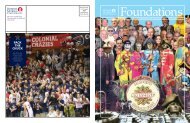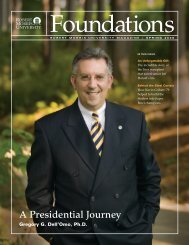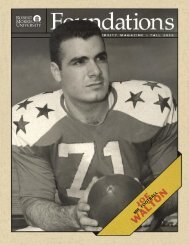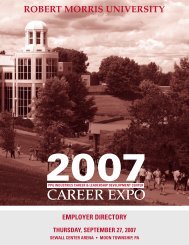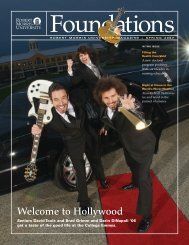Kozol, J. (1995).Amazing Grace: The Lives of Children and the ...
Kozol, J. (1995).Amazing Grace: The Lives of Children and the ...
Kozol, J. (1995).Amazing Grace: The Lives of Children and the ...
You also want an ePaper? Increase the reach of your titles
YUMPU automatically turns print PDFs into web optimized ePapers that Google loves.
<strong>The</strong>re are o<strong>the</strong>r heroes in this neighborhood. Some are <strong>the</strong> mo<strong>the</strong>rs who, like angels, oversee <strong>the</strong>community. <strong>The</strong>ir tales are as harrowing as a ten-year-old drug user. "I think <strong>of</strong> a woman,Charlotte Smith, who this morning buried her fourth child but remains a fighter, upright <strong>and</strong>unbroken. But good Lord! <strong>The</strong> miseries around her are so vast." (p. 72)I hear on <strong>the</strong> sidewalks people sneering at <strong>the</strong> homeless <strong>and</strong> casually saying, "Get a job." Butwhat if like in Mott Haven, <strong>the</strong>re simply are not enough jobs? "<strong>The</strong> greatest need in <strong>the</strong>neighborhood is real employment. Some <strong>of</strong> <strong>the</strong> men come in here <strong>and</strong> <strong>the</strong>y want a job so bad.You see it in <strong>the</strong>ir eyes. <strong>The</strong>y ask. <strong>The</strong>y question me continually. I have to tell <strong>the</strong>m honestlythat <strong>the</strong>re is nothing her," explains <strong>the</strong> security director <strong>of</strong> a complex. (p. 62)I once was lost....Lost on <strong>the</strong> sea <strong>of</strong> poverty without a paddle to steer <strong>the</strong>m to safety, Anthony tries to examinewhy we are here <strong>and</strong> why his peers can't move in <strong>the</strong> right direction with <strong>the</strong>ir lives. "I believethat we were put here for a purpose, but <strong>the</strong>se people on <strong>the</strong> streets can't see a purpose. <strong>The</strong>re's awhole world out <strong>the</strong>re if you know it's <strong>the</strong>re, if you can see it. But <strong>the</strong>y are in a cage. <strong>The</strong>y cannot see." (p. 24) When you can't see past <strong>the</strong> storm because you know that you can't even findyour compass, you can feel very trapped, indeed.<strong>The</strong> power <strong>of</strong> Anthony's insights hits home because <strong>of</strong> <strong>the</strong> simple way that he states <strong>the</strong> truth <strong>of</strong>his community. He tosses aside <strong>the</strong> political correctness that runs rampant in our college courses<strong>and</strong> speaks from his gut about his peers. "I feel afraid <strong>of</strong> my own people, my own race, blackpeople, students my own age. You step on someone's foot or look at somebody <strong>the</strong> wrong way -if he doesn't like your attitude, he might pull out a gun <strong>and</strong> kill you." (p. 47) How can Anthonyeven leave <strong>the</strong> house when he is so afraid <strong>of</strong> <strong>the</strong> dangers <strong>of</strong> <strong>the</strong> street <strong>and</strong> his own people?<strong>Kozol</strong>'s book does not h<strong>and</strong> us <strong>the</strong>se answers, instead he lets <strong>the</strong> reader formulate <strong>the</strong> questions<strong>and</strong> brainstorm <strong>the</strong> answers.<strong>The</strong>re are o<strong>the</strong>r voices in this text that tell <strong>the</strong> story this area <strong>of</strong> New York. One poet that lives in<strong>the</strong> community paints a picture with his words. "I see New York as a symbolic city," explainspoet Mr. Castro, "<strong>The</strong>se buildings are our concrete prisons piled up like Babel. A satanictechnology surrounds us. What we see is apparatus, not humanity." (p. 45) Mentions <strong>of</strong> feelingtrapped or imprisoned are peppered throughout <strong>the</strong> book adding to <strong>the</strong> sense <strong>of</strong> claustrophobia<strong>and</strong> <strong>the</strong> impression that <strong>the</strong>re is no way out.When Mr. Castro was asked by <strong>Kozol</strong> why <strong>the</strong> children in <strong>the</strong> nazi camps came to his mind whenwe were speaking <strong>of</strong> this neighborhood, he answers with a caution I have heard from o<strong>the</strong>rs,Mrs. Washington included, when a reference to <strong>the</strong> holocaust was made. "It is not <strong>the</strong> same," hesays. "But <strong>the</strong>re are some similarities. <strong>The</strong>re is <strong>the</strong> feeling <strong>of</strong> eclipse. <strong>The</strong>re is <strong>the</strong> likelihood <strong>of</strong>death for many. <strong>The</strong>re is <strong>the</strong> sense <strong>of</strong> people watching from outside but seeming paralyzed <strong>and</strong>doing nothing. And <strong>the</strong>re are <strong>the</strong> miracles." (p. 240)<strong>The</strong> injustices in this community are so great that <strong>the</strong>y hardly ever utter <strong>the</strong> word "injustice."Fa<strong>the</strong>r Glenworth Miles explained <strong>the</strong> reason for this, "How <strong>of</strong>ten do you speak about <strong>the</strong> air? If




